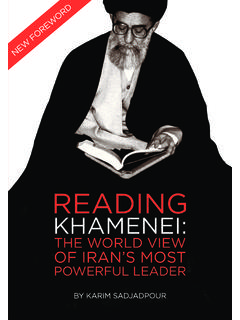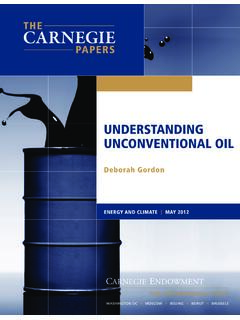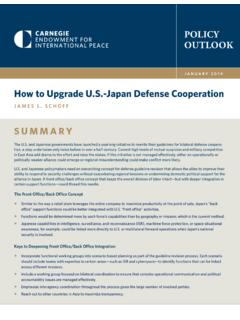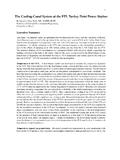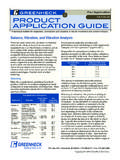Transcription of BEIJING BEIRUT BRUSSELS MOSCOW WASHINGTON
1 THE UKRAINE CRISIS AND THE RESUMPTION OF GREAT- power RIVALRYD mitri TreninJULY BEIRUT BRUSSELS MOSCOW WASHINGTONTHE UKRAINE CRISIS AND THE RESUMPTION OF GREAT- power RIVALRYD mitri Trenin 2014 Carnegie MOSCOW Center. All rights Carnegie MOSCOW Center and the Carnegie Endowment do not take institutional positions on public policy issues; the views represented here are the author s own and do not necessarily reflect the views of Carnegie, its staff, or its part of this publication may be reproduced or transmitted in any form or by any means without permission in writing from the Carnegie MOSCOW Center or Carnegie Endowment. Please direct inquiries to:Carnegie MOSCOW Center 16/2 Tverskaya MOSCOW , 125009.
2 Russia P +7 495 935 8904 F +7 495 935 8906 publication can be downloaded at no cost at 220 About the Author vSummary 1 Introduction 3 Origins of the Ukraine Crisis 4 Russia s Policies 6 The Western Response 8A History of Unsuccessful Rapprochement 9 The Wider Geopolitical Context 12 The Implications of the Ukraine Crisis 15 Conclusion 24 Notes 27 Carnegie MOSCOW Center 28 ContentsvDmitri Trenin, director of the Carnegie MOSCOW Center, has been with the center since its inception.
3 He also chairs the research council and the Foreign and Security Policy retired from the Russian Army in 1993. From 1993 to 1997, Trenin held a post as a senior research fellow at the Institute of Europe in MOSCOW . In 1993, he was a senior research fellow at the NATO Defense College in served in the Soviet and Russian armed forces from 1972 to 1993, includ-ing experience working as a liaison officer in the external relations branch of the Group of Soviet Forces (stationed in Potsdam) and as a staff member of the delegation to the nuclear arms talks in Geneva from 1985 to 1991. He also taught at the War Studies Department of the Military Institute from 1986 to the Author1 SummaryThe Ukraine crisis that erupted in early 2014 has brought an end to the post Cold War status quo in Europe.
4 Russia, feeling betrayed by its Western partners because of their support for regime change in Kiev, has stepped forward to protect its vital interests which the West saw as aggression by a revisionist power . The ensuing conflict will last long and have an impact far beyond Europe. Great- power Competition Is Back The Ukraine crisis has ushered in a period of rivalry, even confrontation, reminiscent of the nineteenth-century Great Game, a fight for supremacy between the Russian and British Empires. The competition is asymmetrical and highly unequal. This conflict is being waged mainly in the political, economic, and informa-tion spheres, but it has military overtones as well. It differs from the Cold War in that human contact, trade, and information flows are not completely shut off, and there is a modicum of cooperation.
5 Russia is focused on post-Soviet integration in Eurasia, while the United States has initiated a series of measures to restore a holding line against Russia in Europe. The approach toward Russia reflects traditional concerns, even pho-bias, and is not based on an adequate understanding of the country, in part because Russia has ceased to be a focus of foreign policy. The international system is becoming more balanced, and WASHINGTON needs to prepare for this by developing policies that account for the interests of major players, including Russia. Global Implications Ukraine, Moldova, and Georgia will be the battleground in the fight for influence. A number of other countries and territories, including Armenia, Belarus, Kazakhstan, the Russian North Caucasus and Crimea, and the Baltic states, may also be affected by this | The Ukraine Crisis and the Resumption of Great- power Rivalry In Central Europe, Poland, which has been most directly involved with the crisis over Ukraine, has toughened its attitudes toward Russia.
6 Western Europe s relations with Russia have changed significantly since the outbreak of the Ukraine crisis. The period of cooperation and mutual understanding ushered in by Soviet leader Mikhail Gorbachev s agreement to Germany s reunification is over. Faced with an increasingly hostile West, Russia is visibly turning East. In particular, China and Russia have become closer, signing a historic gas deal, conducting joint naval exercises, and increasing trade. Russia s hardball policies in Ukraine and its defiance of the United States have won it increased credibility in the Middle East. 3 IntroductionThe political crisis that erupted in Ukraine in early 2014 has ended the period in Russian-Western relations that began with the fall of the Berlin Wall in The crisis marks the end of a generally cooperative phase in those rela-tions, which even included a failed effort at Russia s integration with or into the West on its own terms.
7 Instead, the Ukraine crisis has opened a new period of heightened rivalry, even confrontation, between former Cold War the face of it, this new period is broadly reminiscent of the Cold War, but it differs from it in important ways. Today s situation has a values component to it but is not nearly as focused on ideology as the conflict between communism and lib-eral democracy was. It has a traditional military dimension too, but this aspect is not as yet dominant. The current crisis has global implications, but, in and of itself, it is not central to the global system. Most importantly, unlike the Cold War, the present crisis is not the organizing principle of either world politics or even the foreign policies of the conflict s main con-testants, particularly that of the United States.
8 If historical analogies are of any use, parallels to the nineteenth-century Great Game for supremacy between the Russian and British Empires would be more to the point, except, of course, that the present rivalry is severity of the crisis came as a surprise to many, in Ukraine itself, Russia, the European Union (EU), and the United States. Not that the gesta-tion of the crisis and the steadily worsening environment in Russia s relations with the West had been overlooked. Rather, many Ukraine watchers who con-tinued to believe that the more the country changes, the more it stays the same were caught off guard by the dynamics on the ground. In late February 2014, Ukraine moved too far and too abruptly to the West and lost balance.
9 Just before that, policy in support of democratic change in Ukraine had steered past safe limits. Russia felt cornered, and its reaction surprised many Russians, not to speak of Ukrainians and Westerners. This new battle for influence is very real and will have major ramifications beyond just Ukraine. The confrontation will take some time to lead to an out-come, and neither the time frame nor the result can be clearly foreseen at this point. What is clear, however, is that the Euro-Atlantic region has entered a different Ukraine crisis has opened a new period of heightened rivalry, even confrontation, between former Cold War | The Ukraine Crisis and the Resumption of Great- power Rivalry Origins of the Ukraine Crisis The Ukraine crisis was immediately preceded by competition between the EU and Russia for the future geoeconomic orientation of Ukraine.
10 The roots of the crisis lie in the 2008 war between Russia and Georgia, which ended the pros-pect of enlargement of the North Atlantic Treaty Organization (NATO) for both Georgia and Ukraine, and in the beginning of the global financial crisis, which seemed to give more credence to regional economic arrangements. Then, the EU and Russia drew different conclusions from the war and the crisis. The Europeans, through the Eastern Partnership program the EU launched in 2009, looked to associate Ukraine, along with five other former Soviet repub-lics, economically and politically with the Rather than a step toward future EU enlargement, however, this initiative was an attempt to constitute a zone of comfort to the east of the union s border and enhance these coun-tries Western Russian Federation, for its part, tried to attract Ukraine and most of the rest of the former Soviet Union to its flagship project of a customs union, also energized in 2009.

